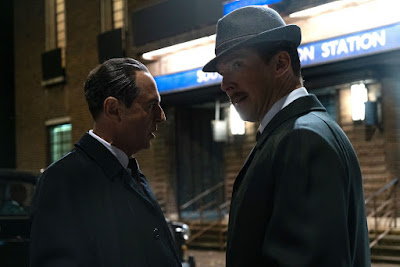“The Courier” is set against the backdrop of the Cuban Missile Crisis, and while we do glimpse Khrushchev in an early scene giving a fiery speech to the hordes, director Dominic Cooke’s movie does not retell this U.S./Soviet standoff through the eyes of the major players but key players in the background, those more likely to watch the events unfold on television, to somehow feel the importance but not necessarily the immediacy, like it’s a world away. Indeed, when Greville sits down to lunch with Emily Donovan (Rachel Brosnahan) and Dickie Franks (Angus Wright), officers of the CIA and MI6 respectively, the way Cumberbatch plays the moment mirrors his earlier drink with clients. When his counterparts, however, explain why they are really there, to use his business as a cover for being courier to Oleg, sneaking information out of the Soviet Union and to British intelligence, the camera shifts from head on to the side and seems to lose Greville in the shadows.
At first, as Greville goes back and forth, and Oleg comes to London, the spycraft seems simple, if not carefree, underlined in a montage set to Chubby Checker’s “The Twist.” But when Greville thinks his mission is complete, Emily asks him to go back in because the nuclear threat is worsening, an indelible scene where Brosnahan’s mellowness suddenly, perceptibly shifts as she impresses upon him the global danger of what’s about to unfold and how it could harm him, his wife, his children. If she’s not necessarily wrong, there is nevertheless something manipulative about this moment, which Cooke does not let pass unnoticed by highlighting in the face of Franks in close-ups, like he can’t believe she’s going there.
There are familiar elements to the genre that Tom O’Connor’s screenplay, alas, cannot evade, like trouble on the homefront. Still, as Greville’s wife Sheila, Jessie Buckley brings a refreshing dignity to the part. She is not just his shoulder to lean on and she is not just weepy-eyed when he keeps abandoning his familial responsibilities for reasons he cannot share; Buckley ensures we sense a line being drawn in the sand between the two, putting into stark light the whole business (about country or friend). Greville, meanwhile, is set up as a drinker and carouser to lend credence to the script’s feint that Sheila thinks he is having an affair, though “The Courier” never really sees it through and Cumberbatch is playing boisterous more than lecherous. At the same time, however, Cumberbatch and Ninidze deftly evince a surface level friendship almost imperceptibly giving way to fierce loyalty so that Greville’s bravest decision, choosing to help Oleg flee the Soviet Union, seems to rise from within Cumberbatch, as opposed to merely being the product of a dramatic moment in the screenplay, while their moved yet mournful demeanor in a scene where they stand and applaud at the Bolshoi casts it as nothing less than a last supper.
It is a last supper because it precedes Greville being imprisoned after unsuccessfully attempting to help Oleg escape the Soviet Union. Here, however, is where Cooke’s penchant for aesthetic flourishes, weird angles and eerie shadows, catches up to him, transforming what should be terrifying into a lengthy passage too arty for its own good. Cumberbatch, at least, is up to the challenge. There is a vacancy in his eyes throughout, rhyming with the strange sight of his shaved head, suggesting what confinement will do to a man. Even better, though, is the sequence in which he enters prison, like an inverse of the end of “Captain Phillips”, where rather than the pressure of the entire ordeal suddenly, innately spilling out of him, Cumberbatch plays not with panic or even fear but a dazed sensation suggesting the sudden paralysis of life as you know it being gone.





No comments:
Post a Comment